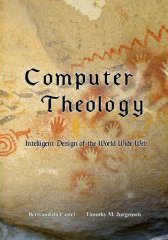PRESS
COMPUTER THEOLOGY |
||||
|
nuclear and thermonuclear devices in the United States
arsenal. As a personal historical anecdote, we recall few if any instances of
practicing fallout drills during the
early days of the cold war. Such drills were the fodder of a number of Civil
Defense films, illustrating how students in school might take defensive
positions under their desks as a shield against the flash of an exploding
nuclear bomb. The general assumption in Sayre was that, should the Cold War
transform into a hot war, our school
would fall within the margin of targeting error of so many incoming
intercontinental missiles that hiding under a school desk or ducking into a
fallout shelter was going to offer little solace to the near instantaneous
vaporization resulting from literally tens or hundreds of megatons of explosive
capacity unleashed on or near us. We mention these points merely to note, as we
have said quite often, that understanding is based on context. Moreover, we
suggest that one can garner very interesting context in unexpected places. Our
collective context tended to reach somewhat beyond the local cotton patch. Thus, with this bit of presentation of
context, we arrive at our consideration of the prospects of the evolutionary
progression of computer networks into the future. As we have also often noted,
computers comprise the most complex set of tools yet constructed by any
species. More important, among the tools of humans, computers are the most capable
of supporting processes across the full range of individual appetites. They
facilitate satisfying the needs of the mind as well as of the body. Existing
variants of computers provide significant support for and enhancements to the
human sensori-motor system. They enable people to interact across time and
space with other people and with the computers and ancillary tools of other
people. However, a methodical examination of existent systems suggests that
something is amiss in this magnificent repertoire. In particular, we note
significant deficiencies in the support across the full range of human
cognitive facilities; at least, compared to the capabilities enabled through
evolution-derived direct interaction processes. Very specifically, computers in
general are lacking in the mechanisms through which trusted groups are formed
and maintained. These mechanisms have proven to be extremely beneficial to the
species across the ages. Rather, in their current incarnations, computer
networks serve to diminish the threat detection and aversion facilities that
groups have historically provided. In particular, when we pursue interactions
across the Internet wide-area network, the result is often to establish in us
an altered state of consciousness, due to distortions induced in the human
sensori-motor system and in the cognitive facilities through which the
connection between sensory input and motor output is effected. As currently
instantiated, computers and computer networks tend to allow the predators of
and on the human species to bypass our defenses where we are at our most
vulnerable, in our privacy and our physical isolation. We suggest that in order
to address these deficiencies and to more fully exploit the beneficial
capabilities that computers provide, there may yet occur an evolutionary
extension of the computer species; or, perhaps more correctly, there may yet
emerge a new species of computer. This new species would serve to facilitate
the traits of human social ecosystems; to amplify without distortion the
capabilities of our individual sensori-motor systems and to more fully project
the facilities necessary to fulfill our individual and collective needs. To
accomplish these goals, we might ask, “What is missing in current networks?” In
a word, trust! In Chapter 5, we observed that social ecosystems are grounded first in the establishment, conveyance and application of trust. Successively larger and more successful groups were founded on phylogenetically derived facilities enabled by human evolution. Only within a viable trust infrastructure does it become feasible to create an effective policy infrastructure. Furthermore, the multiple policy infrastructures that we find ourselves having to navigate, some of them exceedingly complex, could certainly be better addressed with cognitive tools especially designed for the purpose. This, it would seem, best describes the evolutionary nexus that we anticipate; a species of computer that is grounded first in the establishment of trust and then in the |
||||
|
||||
© Midori Press, LLC, 2008. All rights reserved for all countries. (Inquiries) The contents of ComputerTheology: Intelligent Design of the World Wide Web are presented for the sole purpose of on-line reading to allow the reader to determine whether to purchase the book. Reproduction and other derivative works are expressly forbidden without the written consent of Midori Press. Legal deposit with the US Library of Congress 1-33735636, 2007.
|
ComputerTheology Intelligent Design of the World Wide Web Bertrand du Castel and Timothy M. Jurgensen Midori Press, Austin Texas 1st Edition 2008 (468 pp) ISBN 0-9801821-1-5 |
Book available at Midori Press (regular) |
